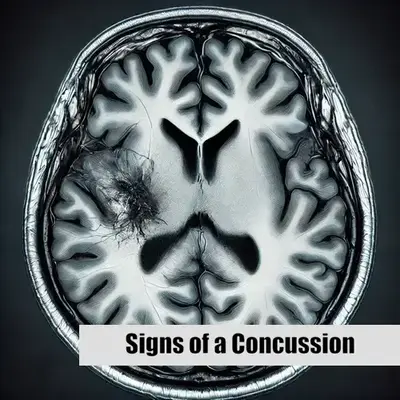Imagine you’re at a soccer game, and suddenly, a player gets hit in the head with the ball. That player, Elena, seems a bit dazed but shakes it off and continues playing. A few hours later, she starts feeling dizzy and develops a headache. Despite appearing fine initially, these are classic signs of a concussion—an injury that can have serious consequences if not properly treated.
Symptom Breakdown: What Are the Signs of a Concussion?
Concussions are common head injuries, often resulting from sports, falls, or accidents. Identifying the symptoms early is critical to prevent long-term damage. Here are the most common concussion symptoms:
- Headache: One of the most immediate signs after a blow to the head.
- Dizziness or balance issues: Feeling off-balance or lightheaded.
- Nausea and vomiting: Some people may feel sick or throw up after the injury.
- Memory problems: Difficulty remembering events before or after the injury.
- Sensitivity to light and noise: Feeling uncomfortable in bright or noisy environments.
- Fatigue: A general feeling of tiredness or lack of energy.
- Confusion or “brain fog”: Trouble concentrating or thinking clearly.
- Loss of consciousness (in some cases): Passing out briefly, though many concussions don’t involve this.
Diagnostic Path: How Is a Concussion Diagnosed?
When someone shows signs of a concussion, the diagnosis typically involves a thorough evaluation by a healthcare professional. This often includes:
- Neurological Exam
Doctors assess reflexes, coordination, and balance to check for any neurological damage. - Cognitive Testing
These tests evaluate memory, concentration, and ability to recall information. - Imaging (in severe cases)
CT scans or MRIs are used to rule out more serious brain injuries like bleeding or swelling.
The following table outlines typical concussion severity levels and associated symptoms:
| Severity Level | Symptoms | Treatment Needed |
|---|---|---|
| Mild | Headache, slight confusion, no loss of consciousness | Rest, monitoring, no physical activity |
| Moderate | Persistent headache, dizziness, brief memory loss | Doctor visit, rest, and gradual return to activities |
| Severe | Prolonged confusion, loss of consciousness, repeated vomiting | Immediate medical attention, possible hospitalization |
Deep Dive: What Happens in the Brain During a Concussion?
A concussion occurs when a blow or jolt to the head causes the brain to move rapidly back and forth, hitting the skull’s interior. This can result in temporary damage to brain cells and cause symptoms ranging from mild to severe.
The brain’s protective fluid is sometimes insufficient to prevent this impact, and the resulting injury can lead to:
- Swelling: Inflammation of the brain tissue, leading to pressure and discomfort.
- Reduced Functionality: Cognitive functions like memory, decision-making, and concentration may be temporarily impaired.
- Delayed Symptoms: In some cases, symptoms like headaches or confusion don’t appear immediately, making it crucial to monitor anyone with a head injury for at least 48 hours.
Treatment Comparison: How to Manage a Concussion
Treatment for a concussion varies depending on the severity. However, the primary focus is rest and avoiding activities that could worsen the condition.
- Rest and Recovery:
- Physical Rest: Stop all physical activities, including sports or exercises, until cleared by a doctor. Rest is critical in the first few days after the injury to allow the brain to heal.
- Mental Rest: Avoid activities that require mental effort, such as reading, using computers, or watching TV. Even focusing on a smartphone can worsen symptoms.
- Gradual Return to Activity:
- After symptoms subside, you can slowly begin to reintroduce normal activities. It’s essential to follow a healthcare provider’s guidelines during this phase, as returning to sports or work too soon can risk further injury.
- Symptom Management:
- Over-the-counter pain relievers like acetaminophen can be used for headaches. Aspirin and ibuprofen should be avoided, as they can increase the risk of bleeding.
- Avoid alcohol and quit smoking if applicable, as these substances can interfere with the brain’s healing process.
Outcome Story: Real-Life Recovery
Take David, for instance. He fell off his bike, hit his head, and felt a bit off for a few days. Initially, he didn’t think much of it, but his symptoms worsened—he began experiencing confusion and nausea. After visiting a doctor, David was diagnosed with a moderate concussion. By following a strict rest regimen and slowly returning to his regular activities, he recovered fully within a few weeks.
Don’t Take Head Injuries Lightly
Concussions are not to be ignored, as even mild ones can have serious consequences if left untreated. The key to a successful recovery is recognizing the signs early and seeking proper medical attention. Whether it’s from a fall, sports injury, or accident, protecting the brain is crucial for long-term health.









